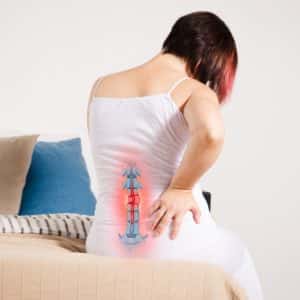
- Pinched nerve. Nerve compression can occur for a number of reasons. The nerve may be inflamed, it may be compressed by a disc or other structural abnormality, or it could be damaged due to an acute injury. A pinched nerve may cause shooting pain or intense pain with certain movements. Conservative treatment may include rest, ice or heat, anti-inflammatory medication, and physical therapy. Depending on the reason the nerve is compressed, surgery may be needed to create more space for the nerve to exit the spinal column.
- Herniated disc. A herniated disc is a spinal disc that has shifted out of its normal position. The movement of the disc impacts surrounding nerves. Compression symptoms may include a tingling sensation, numbness, and pain. The discomfort in the low back, where herniated discs are most common, can change a person’s gait and posture, resulting in hip pain. Comfort may improve with anti-inflammatory medications, physical therapy, and posture changes. If conservative modalities do not help, decompression surgery may be needed.
- Spinal osteoarthritis. This condition, which can occur at different levels of the spine, results in inflammation and the breakdown of health spinal cartilage. This breakdown makes it easier for spinal bones to shift and press on nearby nerves. In cases of spinal osteoarthritis in the lumbar area, many people alter their movements, shifting stress to the hips from the spine. The extra stress then leads to hip pain. Medications, exercise, and weight management may help reduce pain and slow the breakdown of healthy cartilage.
Lower back pain and hip pain don’t have to go hand-in-hand when you get to the root issue right away. For help diagnosing the cause of your back pain, schedule a visit at one of our conveniently located offices.


